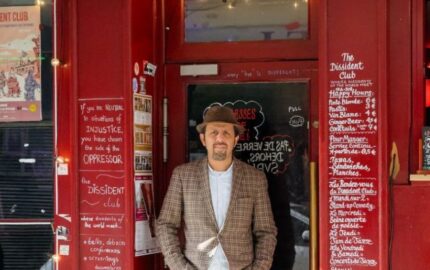Journalist and author Mónica Guzmán, a 2016 Nieman Fellow, believes trust can't be formed by one side demonizing the other. But that’s often what those on either side of the political divide try to do, whether it’s a family debating at the dinner table, talking heads sparring on TV, or partisan media outlets disparaging a broad swath of the public. This mentality simply takes us further from understanding each other, Guzmán says, and it entrenches us in our assumptions and judgments, and our belief that we operate with different values than the other side.
More often than not, we share the same values but miss possible points of connection because we don’t really know each other, Guzmán says, adding that the simplest and most transformative tool to get us out of this trap is curiosity.
Guzmán is the author of the book “I Never Thought of It That Way: How to Have Fearlessly Curious Conversations in Dangerously Divided Times,” and is a senior fellow at Braver Angels, an organization dedicated to political depolarization. She also hosts the podcast “A Braver Way.” Guzmán believes being curious about people we disagree with, and engaging with them, is the only way to depolarize our society.
Guzmán spoke with Nieman Reports about extending this philosophy to journalism, and how news outlets and journalists need to approach people from all walks of life with genuine curiosity. Only if people feel seen and understood will they be open to new information.
The conversation has been edited for length and clarity.
When I started in journalism — in my internships in college and then into the profession itself — I used to be pretty shy and I remember an early assignment, just one of those man-on-the-street things, and the idea that I would interrupt somebody to ask them a question, that I would be that demanding or intrusive, was just scary. And then at some point … it just became addictive. Because it turns out people are so fascinating, and a lot of them, if you ask questions curiously, meaning you really want to know something they know and you don’t, and you’re coming at it with a kind of nonjudgmental posture of understanding, they are often delighted and surprised even by their own answers.
That happened when I contrasted the conversations I tended to see in the public sphere that were political with the conversations I was having with my parents. There were just so many times where we could have shouted at each other or asserted something, or we could have reacted to each other’s opinions with a sense of certainty. And we didn’t. And it turns out, a lot of the times that I had formed a judgment about them or their beliefs, it would change after I asked.
Then I just paid attention. I paid attention to the media, how these sorts of things tend to go on TV. Clearly, the goal is not really understanding. And so the model is not very curious. I just thought, “Man, if only we would ask a little more, we would see that there’s more there.”
As much as we like to say that reality is one thing, when you look at how much our human world is all about the actions people take in it, the perspectives that they have on reality, what the truth is to them … what things matter to them ends up being more important than any sense of objective reality.
If the goal is for everyone to see one reality, then the best way I know to do that, that the research points to, is we need to have more contact with each other. Yeah, it’s not about what we read. It’s about, do we even know something about different people’s lives and how they will construct the world differently based on their preferences and priorities?
No matter what I happen to think or how I react to a belief or a perspective that’s being expressed in the public sphere … by not reading those things, they don’t cease to exist as forces in my life and in my country. You can’t avoid that other way of looking at reality and somehow get somewhere. I mean, you’ll get to a less reactive place, which is kind of the formula many people have been following. But that, of course, deepens the divide that I believe is causing the most harm of all, because it is destroying trust at the baseline of everything upon which truth rests. You can’t get to a collective understanding of truth without trust. People won’t be honest enough. They’ll be too scared, too reactive.
Because this world is so divided, and misperceptions and exaggerations are rampant across divides, you are more than likely not going to have an accurate view of the debate and the issue that you’re actually trying to fight for. So without checking in with the actual opponent, the primary source of the views, you’re going to be a victim of the rhetoric and the hyperbole that’s out there. You may end up posting things on social media that actually make things worse, because you’ll get a lot of likes [from] people who agree with you, and the people who disagree with you are just gonna see you as so removed and judgmental and not even worth engaging on their own side. You’ll get points, you’ll get status, but you won’t get change.
I think it is possible, and I don’t think enough of us are working on it — whether you think of it as an outlet, a space, a hub — some discursive, shared form where sense is being made by professionals like journalists, storytellers who are sharing it in such a way where there’s no detection of favor on one side of the other… and everyone actually feels like they can hear and be heard by each other. To me, that’s the Holy Grail.
When you were saying, “How do we build a shared reality?”, if our Fourth Estate could do that, that would be great. But what it would require would be a kind of structure in the organization, kinds of values and conventions and behaviors that are brutally anti-polarizing. There’s a few experiments that are fabulous on this front, the most famous being Tangle News by the journalist Isaac Saul. The format for his daily newsletter has attracted a lot of interest. He has a truly cross-partisan audience. He’ll tell you what his views are, but he’ll only tell you what his views are after he has generously and thoroughly looked at and explained the other views.
Now that’s one guy, one journalist, doing a newsletter. To get to that at the level of The New York Times or Fox News or CNN — pretty tall order. And I think one of the reasons it’s so hard is that you can’t scale trust. We keep trying, but trust is built on a human-to-human level, and the less trust there is in the water, the more the individual journalist needs to demonstrate, reader by reader, that they actually are trying very hard to understand all sides.
I think … there are people so consumed by hate that they are worth fearing. But when I hear [that question], I hear potentially an argument for not bothering … like, “You can’t engage with a different value set when the value set is so abhorrent.” What I put into that is a lot of questions: Can values change? Is the world better when someone’s value set changes from something genuinely harmful to something wonderful, and then how does that happen? I’ve learned about a lot of examples where the only way that happens is through engagement.
I think they’re just few and far between, but I don’t want to make that sound like no one’s trying. Everyone’s trying. There’s a newsletter called The Flip Side and it shows the best commentary from the right and the best commentary from the left and the best commentary from libertarians, and it just helps me think better and not be stuck in my assumptions about the other side’s argument. Sometimes at the end, you’re like, “That’s the strongest thing they’ve got. And it’s not enough to persuade me. I still really believe in this other thing, but I also am not going to be victim to the vilification that many forces on my side want me to embrace, because I’ve just read a pretty cohesive argument that I hadn’t considered for that side.” These kinds of outlets are vaccines against blinding polarization.
Media is an economic kind of a thing where you have to get your audience. And a great way to get an audience’s attention and to keep it is to really let them know that you think just like them, and you are going to show them the world the way they want to see it. That’s great for building an audience, and it’s terrible for sustaining a democracy. And even the outlets who have right on their taglines and their mission statements, “We’re here for the truth,” even them, especially them, are very motivated by that need to keep people happy and coming.



